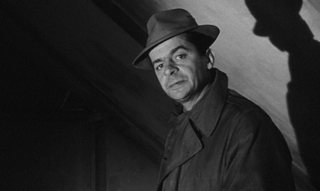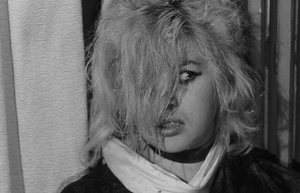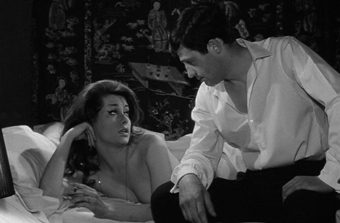
 |
|
|
|
Midway through Jean-Pierre Melville's Le doulos, Jean-Paul Belmondo enters a nightclub and checks his hat. A pretty attendant tags it: #13. Belmondo plays Silien, a slick mobster who doesn't play straight with the cops or his confederates in crime, and manages to fool both. In Paris crime parlance the film's title means "the hat", but also refers to a police informer. Silien is Bad Luck for whomever crosses his path; although played out on the Boulevards and empty lots of the City of Light, Le doulos is as stylized as a Japanese yakuza picture. American thriller fans didn't know what they were missing in the 1950s and early 60s, when our domestic crime fare was restricted to Eisenhower-sanitized pictures like The F.B.I. Story and the occasional Don Siegel shoot-out. French crime thrillers called policiers celebrated hardboiled American crime fiction and depicted everything verboten under the Hollywood Production Code: sympathetic sleazy characters, ruthless violence, casual nudity. French director Jean-Pierre Melville loved everything American to the point of wearing cowboy hats and having his mobsters drive large Detroit cars through those narrow Parisian streets. French crime thrillers of the time put ours to shame, and Le doulos is one of the best. 
Pierre Lesou's story is a clever suspense concoction so twisted, the main bad guy must interrupt the last act to recap the previous action. Since his explanation is a complete lie, viewers who haven't been paying close attention are bound to be confused. Maurice Faugle (Serge Reggiani) exits prison to exact revenge on a fence (René Lefèvre), for reasons not immediately disclosed. The tired-looking Faugle regards himself in a broken mirror, so we know he's the flawed hero. Although a thief and a murderer he believes in the criminal code. Faugle doesn't rat on his friends, whose honor he trusts until proven otherwise. Unfortunately, "honor among thieves" is a cruel myth. Silien (Belmondo) is the exact opposite, a realist who believes in nothing except coming out on top. He's one of the cagiest villains in crime history, as he works a clever double con that convinces both cops and cohorts that he's playing straight with them. In reality, Silien informs, murders, steals from his friends and frames them for murder. Unlucky associates like Faugle are either on the run for crimes they didn't commit or set up for murder, so they can't talk. Film Noir abounds with sharpies who think they can play both ends against the middle and trip over their own plans -- like Harry Fabian in the classic Night and the City. Belmondo's Silien gets away with outrageous deceptions, smooth talking the police and playing the stand-up good pal to the trusting Faugle. He knows he can seduce an old girlfriend in just a few minutes, and convince her to aid him in his schemes. Silien's a marvel. He doesn't even come close to tripping up. 
Le doulos has plenty of well-staged action: a safecracking robbery, some point-blank murders, the killing of a police detective. Detective Superintendent Clain (Jean Desailly) can't shake the truth out of either Silien or Flaugel, and crooked nightclub owner Nuttheccio (guest star Michel Piccoli) hasn't a chance when framed by Silien for robbery and murder. Only in retrospect do we realize that women are at the center of the mayhem, even in a criminal world that keeps them on the sidelines. Faugel consistently makes bad decisions out of loyalty to his girlfriends. Silien mercilessly executes one beauty because his plan requires it. His strategic endgame is to reclaim his old flame Fabienne (Fabienne Dali of Kill, Baby ... Kill), eliminate the man who stole her away and take an early retirement in the country. Jean-Pierre Melville's direction unfolds the tale with unerring logic and clarity, making almost all the characters sympathetic. Nobody acts like a standard hero or villain, as would be the norm in a Hollywood picture. The acting is marvelous, with Belmondo smoothly sincere and Reggiani doggedly honorable. The triple-twist ending, an improvement on the gimmick at the end of the noir quickie The Pretender (1947), is especially satisfying. In this amoral world, one honorable act can ring down the curtain on everyone. 
Criterion's Le doulos is a terrific entertainment. Nicolas Hayer's grey B&W cinematography begins with a moody shot of Faugel traversing a railroad underpass, and mixes gritty street work with glamorous shots of Fabienne Dali. The jazzy music of Paul Misraki is also a big plus. Melville's film is like watching a David Goodis or Ross McDonald paperback come to life. Disc producer Issa Clubb keeps the extras focused and their quality high. Ginette Vincendeau provides an audio commentary that skips selectively around the film rather than attempting to fill 109 minutes with wall-to-wall talk. We're also given amusing, informative interviews with Volker Schlöndorff, who was an assistant on the film, and Betrand Tavernier, who served as the film's publicist. Older excerpts show Jean-Pierre Melville, Belmondo and Reggiani answering questions posed by TV interviewers. An original trailer is incuded, and the folding insert carries an essay by film critic Glenn Kenny.
On a scale of Excellent, Good, Fair, and Poor,
Le doulos rates:
Reviews on the Savant main site have additional credits information and are more likely to be updated and annotated with reader input and graphics.
Review Staff | About DVD Talk | Newsletter Subscribe | Join DVD Talk Forum |
| ||||||||||||||||||